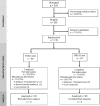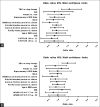5-HTTLPR and MTHFR 677C>T polymorphisms and response to yoga-based lifestyle intervention in major depressive disorder: A randomized active-controlled trial
- PMID: 30581206
- PMCID: PMC6278208
- DOI: 10.4103/psychiatry.IndianJPsychiatry_398_17
5-HTTLPR and MTHFR 677C>T polymorphisms and response to yoga-based lifestyle intervention in major depressive disorder: A randomized active-controlled trial
Abstract
Background: There is growing evidence suggesting that both genetic and environmental factors modulate treatment outcome in, a highly heterogeneous, major depressive disorder (MDD). 5-HTTLPR variant of the serotonin transporter gene (SLC6A4) and MTHFR 677C>T polymorphisms have been linked to the pathogenesis of MDD, and antidepressant treatment response. The evidence is lacking on the clinical utility of yoga in patients with MDD who have 5-HTTLPR and MTHFR 677C>T polymorphisms and less likely to respond to medications (SSRIs).
Aims: We aimed to examine the impact of YBLI in those who have susceptible 5-HTTLPR and MTHFR 677C>T polymorphisms and are less likely to drug therapy with SSRIs.
Settings and design: In a 12 week randomized active-controlled trial, MDD patients (n = 178) were randomized to receive YBLI or drug therapy.
Methods: Genotyping was conducted using PCR-based methods. The clinical remission was defined as BDI-II score ≤ 9.
Statistical analysis used: An intent-to-treat analysis was performed, and the association of genotype with treatment remission consisted of the logistic regression model. A P value of <0.05 was considered statistically significant.
Results: Multivariate logistic regression models for remission including either 5-HTTLPR or MTHFR 677C>T genotypes showed statistically significant odds of remission in YOGA arm vs. DRUG arm. Neither 5-HTTLPR nor MTHFR 677C>T genotype showed any influence on remission to YBLI (P = 0.73 and P = 0.64, respectively). Further analysis showed childhood adversity interact with 5-HTTLPR and MTHFR 677C>T polymorphisms to decrease treatment response in DRUG treatment arm, but not in YOGA arm.
Conclusions: YBLI provides MDD remission in those who have susceptible 5-HTTLPR and MTHFR 677C>T polymorphisms and are resistant to SSRIs treatment. YBLI may be therapeutic for MDD independent of heterogeneity in its etiopathogenesis.
Keywords: 5-HTTLPR; MTHFR 677C>T; depression; gene-environment; meditation; yoga.
Conflict of interest statement
There are no conflicts of interest.
Figures






Similar articles
-
The effect of 677C>T and 1298A>C MTHFR polymorphisms on sulfasalazine treatment outcome in rheumatoid arthritis.Braz J Med Biol Res. 2009 Jul;42(7):660-4. doi: 10.1590/s0100-879x2009000700011. Braz J Med Biol Res. 2009. PMID: 19578646
-
HLA-G 3'UTR polymorphisms & response to a yoga-based lifestyle intervention in rheumatoid arthritis: A randomized controlled trial.Indian J Med Res. 2022 Feb;155(2):253-263. doi: 10.4103/ijmr.IJMR_3196_20. Indian J Med Res. 2022. PMID: 35946202 Free PMC article. Clinical Trial.
-
A 12-Week Yoga-Based Lifestyle Intervention Might Positively Modify Cellular Aging in Indian Obese Individuals: A Randomized-Controlled Trial.J Integr Complement Med. 2022 Feb;28(2):168-178. doi: 10.1089/jicm.2021.0215. Epub 2022 Jan 11. J Integr Complement Med. 2022. PMID: 35167359 Clinical Trial.
-
Pharmacogenetic association of bi- and triallelic polymorphisms of SLC6A4 with antidepressant response in major depressive disorder.J Affect Disord. 2020 Aug 1;273:254-264. doi: 10.1016/j.jad.2020.04.058. Epub 2020 May 11. J Affect Disord. 2020. PMID: 32421611 Review.
-
Association of MTHFR 677C>T and 1298A>C polymorphisms with susceptibility to autism: A systematic review and meta-analysis.Asian J Psychiatr. 2019 Dec;46:54-61. doi: 10.1016/j.ajp.2019.09.016. Epub 2019 Sep 23. Asian J Psychiatr. 2019. PMID: 31614268
Cited by
-
Are There Biological Correlates of Response to Yoga-Based Interventions in Depression? A Critical Scoping Review.Brain Sci. 2024 May 25;14(6):543. doi: 10.3390/brainsci14060543. Brain Sci. 2024. PMID: 38928543 Free PMC article.
-
Comparative Effectiveness of Multiple Exercise Interventions in the Treatment of Mental Health Disorders: A Systematic Review and Network Meta-Analysis.Sports Med Open. 2022 Oct 29;8(1):135. doi: 10.1186/s40798-022-00529-5. Sports Med Open. 2022. PMID: 36308622 Free PMC article.
-
Systematic Review for the Medical Applications of Meditation in Randomized Controlled Trials.Int J Environ Res Public Health. 2022 Jan 22;19(3):1244. doi: 10.3390/ijerph19031244. Int J Environ Res Public Health. 2022. PMID: 35162267 Free PMC article.
-
Yoga for Depressive Disorder: A Systematic Review and Meta-Analysis.Depress Anxiety. 2024 Dec 19;2024:6071055. doi: 10.1155/da/6071055. eCollection 2024. Depress Anxiety. 2024. PMID: 40226719 Free PMC article.
-
Disentangling the biological mechanisms underlying the effects of physical exercise in major depressive disorder: a comprehensive systematic review of randomized controlled trials.Psychol Med. 2025 Jul 16;55:e197. doi: 10.1017/S0033291725100743. Psychol Med. 2025. PMID: 40665827 Free PMC article.
References
-
- World Health Organization. Geneva: World Health Organization; 2017. [Last accessed on 2018 Jan 11]. Depression and Other Common Mental Disorders: Global Health Estimates. Available from: http://www.apps.who.int/iris/handle/10665/254610 .
-
- Verhoeven JE, Révész D, Epel ES, Lin J, Wolkowitz OM, Penninx BW. Major depressive disorder and accelerated cellular aging: Results from a large psychiatric cohort study. Mol Psychiatry. 2014;19:895–901. - PubMed
-
- Baldessarini RJ, Forte A, Selle V, Sim K, Tondo L, Undurraga J, et al. Morbidity in depressive disorders. Psychother Psychosom. 2017;86:65–72. - PubMed
-
- Otte C, Gold SM, Penninx BW, Pariante CM, Etkin A, Fava M, et al. Major depressive disorder. Nat Rev Dis Primers. 2016;2:16065. - PubMed

